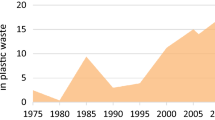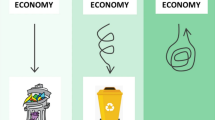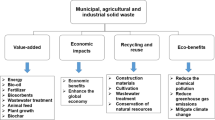Abstract
The global waste sector produces, on average, 2–5 % of global anthropogenic greenhouse gas (GHG) emissions. The amount of GHG emissions has grown steadily and is predicted to increase considerable in the forthcoming decades because of the increases in population and gross domestic product (GDP). However, the GHG mitigation opportunities for the sector are still fully not exploited, in particularly in developing countries. A series of initiatives were highly successful and showed that large reductions in emissions are possible. This study aims to propose a holistic quantification model, which can be used for estimation of waste generation and evaluation of the potential reduction of GHG emissions in waste sector for developing countries with a particular application to Vietnam. The two scenarios set for the study were business as usual (BaU) which waste management is assumed to follow past and current trends and CounterMeasure (CM) which alternative waste treatment and management are assessed. Total emissions in the BaU scenario are projected to increase from 29.47 MtCO2eq in 2010 to 85.60 MtCO2eq by 2030 and 176.32 MtCO2eq by 2050. The highest emissions are due to methane (CH4) released by disposal sites, accounting for about 60 % of the GHG emissions from waste in Vietnam in 2030. This emission is projected to increase significantly (67 % in 2050), unless more of the methane is captured and used for energy generation. The CM scenario gives emission reductions from 25.7 % (2020), 40.5 % (2030) to 56.6 % (2050) compared to the BaU scenario. The highest GHG reduction is achieved through recycling, followed by methane recovery to optimize the co-benefit for climate change mitigation.




Similar content being viewed by others
References
Ashton W, Chertow M, Shenoy M (2009) Industrial Ecology - developing systemic solutions to climate change and other environmental challenges in Indian industry. Sustainability tomorrow
Ayalon O, Avnimelech Y, Shechter M (2001) Solid waste treatment as a high-priority and low-cost alternative for greenhouse gas mitigation. Environ Manag 27(5):697–704
Bogner J, Abdelrafie AM, Diaz C et al (2007) Waste management. In: Metz B, Davidson OR, Bosch PR et al (eds) Climate Change 2007: mitigation. Contribution of working group III to the fourth assessment report of the intergovernmental panel on climate change (IPCC). Cambridge University Press, Cambridge
Bogner J, Pipatti R, Hashimoto S et al (2008) Mitigation of global greenhouse gas emissions from waste: conclusions and strategies from the intergovernmental panel on climate change (IPCC) fourth assessment report. Waste Manag Res 26:11–32
Chintan (2009) Cooling agents: an analysis of climate change mitigation by the informal recycling sector in India. Report prepared in association with The Advocacy Project, Washington DC
Christensen TH, Simion F, Tonini D, Moller J (2009) Global warming factors modelled for 40 generic municipal waste management scenarios. Waste Manag Res 00:1–14
Dehoust G, Wiegmann K, Fritsche U et al (2005) Status Report on the Waste Sector’s Contribution to Climate Protection and Possible Potentials. Commissioned by the German Federal Environmental Agency. Available at http://www.bmub.bund.de/fileadmin/bmu-import/files/english/pdf/application /pdf/klima_abfall_en.pdf
Department of Meteorology, Hydrology and Climate Change and Japan International Cooperation Agency (2014) National Greenhouse Gases Inventory Report 2005 and 2010 of Vietnam (Final draft)
Ferrer J (2012) GHG emission and abatement potential assessment: the case of solid waste management system in Metro Manila, Philippines. OIDA Int J Sustain Dev 4(1):61–70
Gomi K, Shimada K, Matsuoka Y (2010) A low-carbon scenario creation method for a local-scale economy and its application in Kyoto city. Energy Policy 38(9):4783–4796
Harris S (2007) The potential role of industrial symbiosis in combating global warming. In: Proceedings of the International Conference on Climate Change, Hong Kong, 29-31
Hoa NT, Gomi K, Matsuoka Y (2014a) Low carbon energy scenario development in Vietnam. Int Proc Chem, Biol Environ Eng 61(1):1–5
Hoa NT, Hasegawa T, Matsuoka Y (2014b) Climate change mitigation strategies in agriculture, forestry and other land use sectors in Vietnam. Mitig Adapt Strateg Glob Chang 19:15–32
International Solid Waste Association (2009) Waste and Climate Change – International Solid Waste Association (ISWA) White Paper. Available at http://www.iswa.org/fileadmin/user_upload/_temp_/Small_GHG_white_paper_01.pdf. Cited 25 Mar 2015
IPCC (2006) 2006 IPCC Guidelines for national greenhouse gas inventories. The United Nations intergovernmental panel on climate change
Ishigaki T, Chu CV, Nguyen NS et al (2008) Estimation and field measurement of methane emission from waste landfills in Hanoi, Vietnam. J Mater Cycles Waste Manage 10:165–172
Ishigaki T, Hirata O, Oda T et al (2011) Greenhouse Gas Emission from Solid Waste Disposal Sites in Asia, Integrated Waste Management—Volume II, Mr. Sunil Kumar (Ed.), ISBN: 978-953-307-447-4, InTech, DOI: 10.5772/21044. Available from: http://www.intechopen.com/books/integrated-waste-management-volume-ii/greenhouse-gas-emission-from-solid-waste-disposal-sites-in-asia
Keith AW, Susan AT, Subba RN et al (2002) The impact of municipal solid waste management on greenhouse gas emissions in the United States. J Air Waste Manag Assoc 52(9):1000–1011. doi:10.1080/10473289.2002.10470843
Kumar A, Bhattacharya SC, Pham HL (2002) Greenhouse gas mitigation potential of biomass energy technologies in Vietnam using the long range energy alternative planning system model. Energy 28(7):627–654
Ministry of Natural Resources and Environment (2010) The second National Communication of Vietnam to the United Nations Framework Convention on Climate Change, Ministry of Natural Resources and Environment, Socialist republic of Vietnam
Monni S, Pipatti R, Lehtilla A et al (2006). Global climate change mitigation scenarios for solid waste management. Technical Research Centre of Finland. VTT Publications, Espoo. Available at http://www.vtt.fi/inf/pdf/publications/2006/P603.pdf
Ngnikam E, Tawana E, Rousseaux P, Riedacker R (2002) Evaluation of potentialities to reduce greenhouse gases (GHG) emissions resulting from various treatments of municipal solid wastes in moist tropical climates: application to Yaounde. Waste Manag Res 20(6):501–513
Nguyen PT, Matsui Y (2009) Evaluation of the alternative treatment methods for GHG emission mitigation from municipal solid waste management: case study of Ho Chi Minh City, Vietnam. Asian J Energ Environ 10(01):35–52
Pimenteira CAP, Pereira AS, Oliveira LB et al (2004) Energy conservation and CO2 emission reductions due to recycling in Brazil. Waste Manag 24:889–897
PM (2009a) The National Strategy for Integrated Management of Solid Waste up to 2020, vision towards 2050 approved by the Vietnamese Prime Minister (PM) through Decision /2149/QD-TTg in 2009
PM (2009b) The Orientations for Development of Wastewater Drainage in Urban Centers and Industrial Parks up to 2025 and vision towards 2050 approved by the Vietnamese Prime Minister (PM) through Decision 1930/QD-TTg in 2009
PM (2012) The Plan to Manage Greenhouse Gas Emissions and the Activities of Trading Carbon Credits to the World Market approved by the Vietnamese Prime Minister (PM) through Decision 1775/QD-TTg in 2012
Smith A, Brown K, Ogilvie S et al (2001) Waste Management Options and Climate Change, Final report to the European Commission, AEA Technology. Available at http://ec.europa.eu/ environment/waste/studies/pdf/climate_change.pdf
Thao PTM, Kurisu KH, Hanaki K (2011) Greenhouse gas emission mitigation potential of rice husks for An Giang province, Vietnam. Biomass Bioenergy 35(8):3656–3666
UN ESCAP (2009) Economic and Social Survey of Asia and the Pacific 2009, Addressing Triple Threats to Development. Available at http://www.unescap.org/sites/default/files/Survey2009.pdf
United Nations Environmental Programme (2010) Waste and climate change: global trends and strategy framework. United Nations Environmental Programme, Division of Technology, Industry and Economics, International Environmental Technology Centre, Osaka/Shiga
United Nations Framework Convention on Climate Change (2005) Key GHG Data. Greenhouse Gas (GHG) Emissions Data for 1990 – 2003 submitted to the United Nations Framework Convention on Climate Change (UNFCCC). UNFCCC Secretariat, Bonn, Germany
United Nations Framework Convention on Climate Change (2014a) Project 4291 : Methane Recovery and Utilization Project of Dai Viet Co. Ltd, Vietnam. http://cdm.unfccc.int/Projects/DB/RWTUV1293110791.88/view. Cited 25 Mar 2015
United Nations Framework Convention on Climate Change (2014b) ACM0014: Treatment of wastewater. Version 6.0. http://cdm.unfccc.int/ methodologies. Cited 25 Mar 2015
United States Environmental Protection Agency (2006a) Global Anthropogenic Non-CO2 Greenhouse Gas Emissions: 1990-2020. U.S. Environmental Protection Agency, Office of Atmospheric Programs, Climate Change Division
United States Environmental Protection Agency (2006b) Solid waste management and greenhouse gases—a life-cycle assessment of emissions and sinks. 3rd Edition. September 2006
United States Environmental Protection Agency (2013) Global Anthropogenic Non-CO2 Greenhouse Gas Emissions: 2010-2030. U.S. Environmental Protection Agency, Office of Atmospheric Programs, Climate Change Division
World Bank (2009) Potential climate change mitigation opportunities in waste management sector in Vietnam. Background paper. RCEE Energy and Environment JSC (Vietnam) and Full Advantage Co., Ltd (Thailand) submitted to the World Bank Carbon Finance Assist Program—Vietnam
WRAP (2006) Environmental benefits of recycling—2010 update, Final report. Available at http://www.wrap.org.uk/sites/files/wrap/Environmental_benefits_of_recycling_2010_update.3b174d59.8816.pdf
Acknowledgments
This research was supported by the Environment Research and Technology Development Fund by Ministry of Environment Japan S-12 and KAKENHI Grant Number 25870361. The authors would like to acknowledge the generosity of these funds. We would like to thank to Dr. Kei Gomi for his support for this research.
Compliance with ethical standards
ᅟ
Conflicts of interest
I, Nguyen Thai Hoa—corresponding author, declare that they have no conflict of interest.
Research involving human participants and/or animals
This article does not contain any studies with human or animal subjects performed by the any of the authors.
Informed consent
Informed consent was obtained from all individual participants included in the study.
Author information
Authors and Affiliations
Corresponding author
Rights and permissions
About this article
Cite this article
Hoa, N.T., Matsuoka, Y. The analysis of greenhouse gas emissions/reductions in waste sector in Vietnam. Mitig Adapt Strateg Glob Change 22, 427–446 (2017). https://doi.org/10.1007/s11027-015-9679-3
Received:
Accepted:
Published:
Issue Date:
DOI: https://doi.org/10.1007/s11027-015-9679-3




